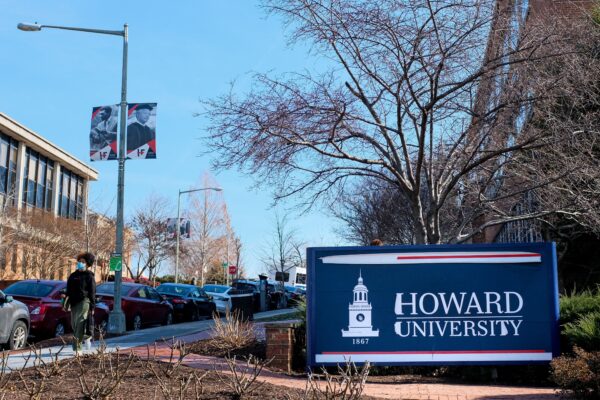FBI Says It Has Identified Individual Responsible for HBCU Bomb Threats, Cannot Press Federal Charges Because He Is a Minor
The Department of Justice says it has identified the individual who terrorized several historically Black colleges and universities during the spring semester of 2022. The FBI has detained a juvenile but cannot federally charge him. Federal authorities are working to have charges brought up against him using multiple state agencies.
Howard University among several HBCUs that received bomb threats. FBI identified the individual responsible but won’t press federal charges. (Photo by MANDEL NGAN / AFP) (Photo by MANDEL NGAN/AFP via Getty Images)
According to a new release from the agency, the campus alerts were “racially motivated threats of violence targeting historically Black colleges and universities” and an investigation “has identified one juvenile,” responsible for a majority of the threats. The DOJ will be working with “state prosecutors to hold the minor accountable.”
On Tuesday, Nov. 15, FBI Director Christopher Wray told the House Committee on Homeland Security, “We have worked with state prosecutors to ensure that that individual is charged under various other state offenses,” CNN reports.
While investigating the bomb threats at 57 schools like Howard University, Delaware State, Morgan State, and the Atlanta University Center, agents identified “several minors believed to be responsible for the first set of threats made between January 4 and February 1, 2022.”
After probing the young people and looking at evidence around the events in question, it was determined only one of the juveniles was responsible for the majority of the threats against the predominantly Black institutions.
The FBI noted the bomb threats came via phone calls, e-mails, instant messages, and anonymous online posts.
On a call with HBCU journalists, FBI Deputy Director Paul Abbate told the students the government was invested in their safety, saying, “the type of threats that we’ve seen here, that have victimized you and your institutions, undermine the most basic expectations of safety and security that every American.”
“Threatening a religious or academic institution is among the most serious and despicable of criminal offenses, especially when your communities have been victimized, historically targeted by hate speech and violence,” Abbate continued.
“The fear and disruption these threats cause within your communities is completely unacceptable and our work in investigating these threats is of the very highest priority.”
The age of the suspect has made the case more complicated than normal, as there are federal limitations associated with “charging under-age perpetrators with federal crimes.”
As a result, the Department of Justice will have to pull in state prosecutors as they seek to hold the suspect accountable for a stream of other “charges unrelated to the specific threats to the HBCUs,” but DOJ is not able to release the individual’s name, age, race, or other identifiers that might reveal his identity.
Despite this restraint, according to the release, there are some penalizations already imposed on the minor. The individual’s online activities will be restricted and monitored by authorities.
The FBI will be working with local, state, and other federal agencies and international law enforcement partners to determine if anyone else is connected to crimes similar to the ones that are associated with threats done by this individual in January and February.
It appears to the agency that some of the threats “originated overseas.” This is a change from an earlier March sentiment put forth by Ryan Young, the executive assistant director of the Intelligence Branch at the FBI, when asked by the chair of the House Oversight Committee, Rep. Carolyn B. Maloney, a New York Democrat.
Maloney asked Young if he believed any of the threats were orchestrated by foreign actors, and he said the FBI had not discovered any evidence that would suggest foreign operatives making the bomb threats.
Investigators believe there were “a distinct set of threats primarily targeting HBCUs received between February 8 and March 2, affecting at least 19 institutions.” The probe found there was also “a distinct set of threats which began June 7 and are ongoing. More than 250 colleges — including seven HBCUs — over 100 high schools, and two junior high schools received bomb and/or active shooter threats.”
Sadly, since the beginning of 2022, almost 60 HBCUs, houses of worship, and other faith-based and academic institutions throughout the nation have been targeted with racially motivated threats of violence.
Norfolk State University alone was targeted on Jan. 4, Feb. 25, and July 12.
African American leaders and organizations blasted the attacks and called on the White House and local law enforcement to use their resources to secure the campuses.
According to Missouri Independent, the Southern Poverty Law Center was one of the loudest voices bringing attention to the dozens of HBCUs that received bomb threats. As they hosted a February meeting to address the issue, Spelman College in Atlanta, was targeted, causing the virtual panel to pause.
Lecia Brooks, the chief of staff and culture for the SPLC, said during the panel, “This was a racist attack that aims to not only disrupt the start of Black History Month, but the perpetrators, we believe, wanted to send a message that even learning while Black is not safe from hate.”
“They clearly underestimated the strength of our treasured centers of learning, whose very existence is rooted in resilience,” she continued.

